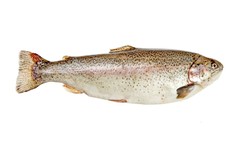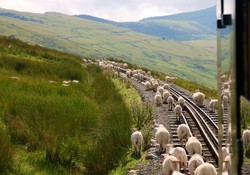Early in his work Cooper explains chalk streams, which are an internationally rare habitat most commonly found in the rolling chalk lands of Southern England, though there are a few in Northern France. These are an internationally rare habitats renowned for their crystal clarity and for the trout that thrive in the alkaline waters that flow upwards from the chalk that underlies Southern England. These waters fell months, sometimes years before they surfaced, as they first sank down into the porous chalk to remain until the saturated rock gave up its excess load.
Yet Cooper tells us that the chalk stream is not a habitat that was discovered by the earliest Britons, but is the product of centuries of history dating back through Mediaeval times. In ancient times the stream would have been a muddy meander sloshing shallowly through a valley, but as humans began to use the valleys they established water mills, which necessitated containing the channel. The result was not only a narrower stream, but lands suitable for farming along the banks. This sort of land gave rise to water meadows, lands whose flooding was managed for the rich mud and water that was added to the soil. so economically valuable were the meadows that a now extinct profession arose to manage them, the drowner. Drowners were men employed to manage the water levels that flowed through the network of channels that took the flooding over the land and moved it off before it overstayed and ruined the soil.
All this human attention meant that the streams became clear of mud and weeds and began to become the ideal home for trout. Soon the Victorians got to know of them, and the chalk streams of the south were a magnet for wealthy anglers, stimulating the development of angling as a business. The use of water meadows has now faded because of artificial fertilizers, but there are moves to preserve them, and Prince Charles is an enthusiastic supporter of the redevelopment of ancient meadows. So there is hope.
Cooper's stream is the Evitt, which flows southwards to the English Channel, for part of its stretch through Gavel's Wood. The term gavel means a payment of dues, and why the wood is so named no one knows, but that is its ancient name. The wood seems to have been allowed to be itself for several hundred years, with no intrusions from agriculture, so it is a piece of Mediaval woodland in a modern landscape.





 Pilgrimage. A reviewon 06/15/2025
Pilgrimage. A reviewon 06/15/2025
 Leo the Fourteenthon 05/09/2025
Leo the Fourteenthon 05/09/2025
 The Melsonby Hoardon 03/25/2025
The Melsonby Hoardon 03/25/2025



Comments
No.sometimes son followed father, but not necessarily.
The second paragraph to the first subheading, Crystal stream and ancient wood, considers that "Drowners were men employed to manage the water levels that flowed through the network of channels that took the flooding over the land and moved it off before it overstayed and ruined the soil."
Does drowner-ing involve an unbroken line of practitioners? Or is the skill set something of the past?
World wildlifenfund is very reliable.
English Wikipedia counts a world-wide total of 210 chalk streams.
That Chalk Stream article designates as 160 those in England. It gives as its source Fred Pearce's "The threat to chalk streams, our unique contribution to global ecology" in the Guardian issue July 24, 2014.
The next sentence offers an England-done tally of 224 English chalk streams. It presents as its source World Wildlife Fund-UK for that same year, 2014.
Which number would fit most nicely as the England total?
No, I have not read them.
Digging and digging and digging into online sources finally gave me Ernest Hemingway and Charles Ritz and Frank Sawyer as English-writing sources on French chalk streams!
Have you read them?
I do not know of such a book, but my French is not brilliant.
Thank you!
Online search terms are not forthcoming about northern France's equivalent areas.
Might there be any article or book about the northern French counterparts?
The book concentrates on southern England.
The first paragraph to the first subheading, Crystal stream and ancient wood, alerts us that "Early in his work Cooper explains chalk streams, which are an internationally rare habitat most commonly found in the rolling chalk lands of Southern England, though there are a few in Northern France."
Does the book concentrate upon southern England or does it include a bit or quite a bit of information about northern France?
If the latter is true, what part of northern France inspires the most information?